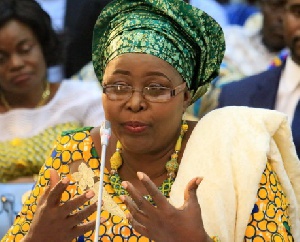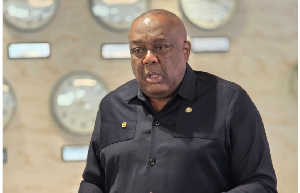Hajia Alima Mahama, Minister of Local Government and Rural Development, said improved local revenue generation at the Metropolitan' Municipal and District Assemblies (MMDAs) is one of the major priorities of Government.
She said the Administration and Management of Internally Generated Funds (IGF) was a shared responsibility between the Ministries of Finance and Local Government and Rural Development, due to their roles of fiscal policy and local Governance respectively.
“Over the years, various interventions have been undertaken to improve revenue mobilisation at the MMDAs level, that notwithstanding, there are still many challenges that urgently need to be addressed,” Hajia Mahama said.
Hajia Mahama said this in a speech read on her behalf at a workshop organised by the Ministry in collaboration with the International Growth Centre (IGC) on the theme: “Improving Local Government Revenue Mobilisation.”
The one-day workshop, which brought together Metropolitan, Municipal and District Chief Executives (MMDCEs) and other stakeholders in decentralisation and local governance, served as a platform to disseminate and discuss findings from a recently completed survey on revenue mobilisation capacity across 216 MMDAs and to consider the possible measures for improving Internal Generated Funds (IGF).
She said Chapter 20 of the 1992 Constitution (Article 245) states that Parliament, shall by law, prescribe the functions of the District Assemblies which shall include; levying and collection of taxes, rates, duties and fees.
Schedule eight and 11 of the Local Governance Act, Act 936 of 2016, expanded on this and empowered Assemblies to collect revenue from a range of sources to complement Central Government transfers and funding from Development Partners.
Dr Nana Ato Arthur, Head, Office of the Local Government Service Secretariat, said the collection of data was an important factor to improving revenue mobilisation at the local level.
This, he said, gave MMDAs the real accounts of what, where, how, and who to generate revenue from with technology.
Dr Ato Arthur urged MMDCEs to set exemplary leadership in the generation and management of revenue of their various assemblies by showing interest in the use of data collection and technology.
Dr Nii Kwaku Sowah, Country Director of IGC, said his outfit aimed at promoting sustainable growth in developing countries by providing demand-led policy advice based on frontier research.
He said the IGC directed a global network of world-class researchers and in-country teams in Africa and South Asia and worked closely with partner governments to generate high quality research and policy advice on key growth challenges.
Dr Sowah said the IGC was based at the London School of Economics and Political Science and in partnership with the University of Oxford and majority funded by the UK Department for International Development.
The research indicated that there were clear challenges to raising more internally generated funds (IGF) in the MMDAs, starting with the lack of official property addresses, which made it difficult for MMDA staff to deliver bills and collect property rates.
According to estimates, about 24 percent of property in the average MMDA had an official address, which indicated that one unambiguous constraint on raising IGF was the lack of technology use.
Less than a third of MMDAs reported using revenue management technologies, including electronic databases of ratepayers and revenue software for billing, collection, and enforcement.
According to the research findings, revenue management technologies are associated with increased billing coverage Assemblies that use revenue management technologies send bills to approximately 23 per cent more of their property than assemblies without such technologies.
At the same time, technology use was associated with more efficient billing delivery. The share of bills that collectors were unable to deliver was 138 percent lower in assemblies with technology.
The research also revealed the strong link between use of revenue management technologies and IGF collection and Calculations revealed assemblies that use revenue management technologies collected 83 percent more IGF per resident, on average, than those that do not.
It said up-to-date property valuations were a key input into revenue management technologies.
In recent years, Lands Valuation Division has worked with many MMDAs to conduct valuations of their property, though many MMDAs still lack official valuations.
The IGC Ghana is one of the 13 resident country programmes on Africa and South Asia and Ghana programme was initiated in 2009 with operation starting in 2010 and is hosted by the Institute of Statistical Social and Economic Research of the University of Ghana, led by Dr Nii Kwaku Sowah, its Country Director.
General News of Thursday, 19 July 2018
Source: ghananewsagency.org













